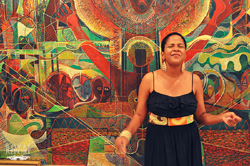Ruth Osman’s music hasn’t yet reached the masses of people, but her message is nonetheless of the masses. Seeking as much of a connection with her audience as her intimate following seeks from her, the singer/flautist deserves a listen.
THE first I heard of Ruth Osman, she was performing in the company of two other ‘Rs’. The trio, a trident of sorts in the local music industry, was fast becoming the standard bearers for young vocalists in Trinidad and Tobago, whether the rest of their peers knew it or not.
Trained in front of a congregation, like most other voices of note before her, Osman’s smoky vocals recall an era almost forgotten: A time when vocalists came with baggage that would haunt their performances, inviting those caught within range of their range to interact with their demons.
There’s a bit more sunshine in her voice, but the approach bears stark resemblance, focusing more on message than the curls her contemporaries utilise to elicit applause.
Ruth Nathania Osman-Rose was born to Raschid and Yvonne Osman in Georgetown, Guyana, a fact easily verified by her gentle accent. Her singing career began inauspiciously.
 |
 |
 |
 |
Eight years old, and with the whole church staring down her throat, she froze during her solo, and the words refused to come. “I was mortified!” she says, forced to recall her long suppressed debut.
Since then, she’s matured as an artist and a person, and approaches the stage differently. “I’d like to think that I’m connecting with people, casting a sort of net that connects us all, and reminds us of our common humanity,” she submits. “The human condition is a beautiful and fragile thing, and I want to help people appreciate it.”
Her father pointed her in the right direction by keeping Frank Sinatra, Sarah Vaughan, Ella Fitzgerald and Billie Holliday around during her formative years. Her husband does the same today, continuously introducing her to new music. “And of course, there’s my manager, Erica, who sees the artist that I want to be and facilitates that transition.”
Alanis Morisette also had a part to play in Ms. Osman’s development, but Tracy Chapman, Nnenna Freelon, Lizz Wright, Argentine singer Mercedes Sosa, Kurt Elling , Leonard Cohen, and Argentine tango composer, Astor Piazolla thankfully kept Ruth from the aggressive guitar riffs. On arriving in Trinidad and Tobago, she’s also been further refined by the directions of Andre Tanker and David Rudder.
But, who’s responsible for the Ruth Osman we see on stage?
“Of course, I’m primarily responsible since I’m the one onstage. I’d like to think that it comes from me, you know; something inspires me, or a particular feeling needs to be expressed, but I’m not sure. I think that, in a way, it also comes through me.”
“I express myself through music; in a way, my sense of self is tied to it. I feel most alive when I’m creating or performing music,” Osman intimates.
The conversation turns to the obvious place, at least for residents and nationals of Trinidad and Tobago.
Osman, who for two years researched and wrote on socio-political issues for a local daily and remains a freelance writer, has found space to address these in her music. And no, her expression was not born out of curfew boredom or being stir-crazy, but, one deciphers, of a genuine concern.
During ‘Rain’, she begs, through pained bars, for precipitation. “And it’s not just Trinidad; it’s the Caribbean as a whole. I can even extend it to other countries outside of our region that were once colonies. Our history prevents us from really seeing who we are, and realising our potential.”
Our history, one of revenge politics and whispered societal division, has as much of a bearing, if not more, as does current affairs on our present malaise.
Middle-aged, we remain young in many aspects, drawn to make juvenile mistakes when we should be developing. This, Osman believes, lies in our past now coming to haunt us.
“Trinidad and Tobago is a place of masks: What’s happening now is that the norms of our society can no longer stand up to careful scrutiny.” The rumbling, she affirms, is the beginning of the rain. “We’re beginning to see it for what it is: A farce. The question is: What will we build in its place? (royalreportmag.com)



.jpg)









